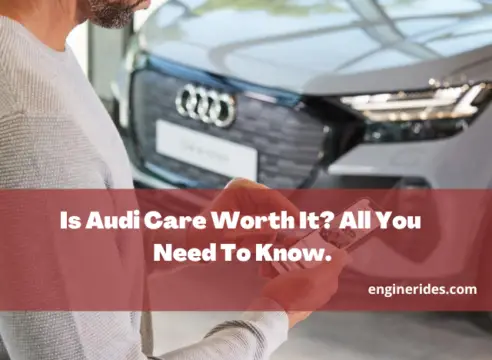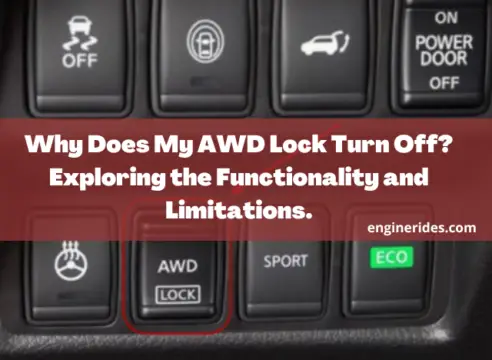Whirring Noise After Engine Off; What Should You Do?
This is one of the most common weird sounds that can come after the engine is off, and I’m writing this blog post to delve into the common issue faced by vehicle owners: a whirring noise heard after turning off the engine.
We’ll explore the potential causes and implications of this noise, offering insights into why it happens and how it can be addressed. This examination is aimed at providing a clear understanding for both seasoned car enthusiasts and everyday drivers.
What Causes a Whirring Noise in Vehicles After the Engine is Turned Off?
When you switch off your car’s engine and hear a whirring sound, it’s natural to feel concerned.

This noise can originate from various components of the vehicle. One common cause is the cooling system. As the engine shuts down, the cooling system, especially the radiator fan, may continue to operate for a short period to bring the engine temperature down to a safe level. This is a normal process, especially in modern vehicles with electronic fans.
Another potential source is the turbocharger in turbocharged engines. After a drive, the turbo needs to cool down to prevent oil coking – the process where oil turns into carbon deposits. The whirring sound could be the turbo’s cooling system working to prevent this issue.
Lastly, it might be the fuel pump or other electrical components winding down after the ignition is turned off. These components often run for a few seconds post-shutdown to complete their cycles.
Is the Whirring Noise a Sign of a Serious Problem?
Understanding whether this noise indicates a serious issue is crucial. In many cases, the whirring sound is a normal part of the vehicle’s operation, as described previously with cooling systems and turbochargers. However, if the sound is accompanied by other symptoms, such as overheating, performance issues, or warning lights on the dashboard, it could signify a deeper problem.
For instance, if the cooling fan runs excessively or doesn’t turn off, it could point to a malfunctioning thermostat or cooling system issue. Similarly, unusual noises from the turbocharger might indicate bearing wear or other mechanical problems that require professional attention.
If the noise becomes louder, more frequent, or changes in character, it’s advisable to have your vehicle checked by a qualified mechanic to rule out any serious issues.
How Can I Diagnose the Whirring Noise Myself?
If you’re interested in diagnosing the whirring noise yourself, there are a few steps you can take.
First, try to locate the source of the noise. Is it coming from the front, back, or under the car? This can help you narrow down the potential causes. For instance, noise from the front might be related to the cooling system or turbocharger, while noise from the back could be the fuel pump.
Next, check for any visible signs of damage or wear in these areas. Look for leaks, damaged wires, or anything that seems out of place. Also, monitor your vehicle’s performance and any dashboard warning lights, as these can provide clues.
Remember, while basic diagnostics can be done at home, certain issues, especially those related to internal components like the turbocharger, often require professional equipment and expertise.
Does A New Transmission Increase Value? All You Need To Know
ENGINERIDES.COM
What Preventive Measures Can I Take to Avoid This Issue?
Preventive maintenance is key to avoiding potential issues related to the whirring noise.
Regularly servicing your vehicle as per the manufacturer’s recommendations is crucial. This includes timely oil changes, cooling system checks, and ensuring the turbocharger is functioning correctly if your vehicle has one.
Additionally, avoid shutting off the engine immediately after high-speed driving or heavy use. Allowing the engine to idle for a short period can help the turbo cool down naturally and reduce the strain on the cooling system. This practice can extend the life of these components and prevent potential issues.
Regular inspections by a qualified mechanic can also help catch any emerging problems before they become serious, ensuring your vehicle remains in good condition.
Can I Drive My Vehicle if It Makes a Whirring Noise After Shutdown?
In most cases, a whirring noise after engine shutdown isn’t a reason to stop using your vehicle. As discussed, this noise is often part of normal operations. However, it’s important to be attentive to changes in the sound or any additional symptoms that might indicate a problem.
If you notice any performance issues, overheating, or warning lights in conjunction with the noise, it’s best to have the vehicle checked by a professional. Continuing to drive under these circumstances could exacerbate potential issues and lead to more significant repairs.
Nissan Rogue Buzzing Noise When Accelerating: Causes, Solutions, And Maintenance Tips
ENGINERIDES.COM
How much will it cost to fix a whirring sound?
The cost to fix a whirring sound that occurs when the engine is off can vary widely depending on several factors:
The cost depends heavily on the root cause of the sound. Common causes include the cooling fan, turbocharger (in turbocharged engines), or other electrical components like the fuel pump, and If the issue requires replacing a component (like a fan or a part of the turbocharger), costs can be higher compared to a simple repair or adjustment.
Labor costs can vary based on location and whether the service is performed at a dealership, an independent shop, or as a DIY project and the labor rates and part prices can differ depending on your geographical location.

For a rough estimate:
- Cooling Fan Issues:- If the problem is related to the cooling fan, it could be as simple as a relay or fuse replacement (often under $100) or as expensive as replacing the entire fan assembly (ranging from $200 to $500 including labor).
- Turbocharger Issues:- These can be more costly. If the turbo needs repair, costs can range from a few hundred dollars to over a thousand, depending on the extent of the damage.
- Electrical Issues:- For problems with electrical components, such as the fuel pump, costs can vary. A fuel pump replacement, for instance, can range from $300 to $900 including parts and labor.
These are rough estimates, and prices can vary. For an accurate quote, it’s recommended to have a mechanic diagnose the issue first.
Some Related FAQs,
Q1: Can weather conditions affect the likelihood of hearing a whirring noise?
Yes, extreme temperatures can make the cooling system work harder, potentially leading to more noticeable whirring sounds after shutdown.
Q2: Is this issue more common in older or newer vehicles?
It can occur in both, but newer vehicles with more electronic components might exhibit this more often due to their complex cooling and turbo systems.
Q3: Does the length of the drive affect the whirring noise?
Longer drives or more intensive use of the vehicle can increase the likelihood of hearing this noise, as the systems have been under more strain.
Q4: Can regular oil changes impact this issue?
Yes, regular oil changes, especially in turbocharged engines, can help prevent issues that might cause unusual noises post-shutdown.
Q5: Should I be concerned if the noise stops suddenly?
If the noise was consistent and suddenly stops, it’s worth getting your vehicle checked to ensure all systems are still functioning properly.







